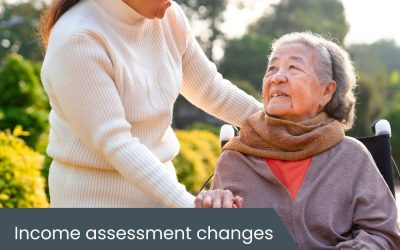Should we pay the accommodation amount as a RAD or a DAP?

It is common for our clients to ask us if they should pay the accommodation amount as a Refundable Accommodation Deposit (RAD) or Daily Accommodation Payment (DAP) when a loved one enters care. Often, the answer will depend on the resident’s financial assets, their cashflow requirements, the plan for the family home and their future wishes.
When moving a family member to residential care, if they are assessed as a market/RAD payer, the facility will advise the accommodation price of the selected room. The resident or their representative will then have the option of paying a Refundable Accommodation Deposit (RAD), a Daily Accommodation Payment (DAP) or any combination of the two.
If they elect to pay the RAD, it will be refunded in full upon departure and it is guaranteed by the Commonwealth Government. However, in lieu of the lump sum RAD, they have the option of paying a DAP which equates to a daily interest payment on any unpaid RAD. The interest rate, referred to as the MPIR (currently 4.01%), is fixed at the date of entry.
By way of example, if the RAD for the selected room was $400,000 and the resident elected to pay $200,000 as a lump sum RAD with the remaining $200,000 paid as a DAP, the daily payment would be: ($200,000 x 4.01%) ÷ 365 = $21.97 per day. Incidentally, the DAP can be deducted from the lump sum RAD to assist with cashflow at any time and any outstanding RAD amounts can be paid at any time to reduce or eliminate the DAP.
There are a number of considerations when deciding what RAD/DAP combination to pay. Our specialist team of aged care advisers tell us this is one of the most complex decisions for many families and it is generally being made at an extremely stressful & emotional time. Often the retention or sale of the resident’s former home will be a critical consideration & this in itself can be a complex issue. For example if retained, the former home will be assessed under the aged care assets test however, it will be exempt under the age pension assets test for up to two years unless a spouse (or other protected person) continues to live there. If it is rented, the net rental income will be assessable under both the aged care and age pension assessments and renting may also trigger a State land tax assessment. In cases where the home is sold the potential impact on the aged care fees and social security entitlements will be based on how the monies are re-deployed.
In some cases, the resident may also have other investments and entities associated with them (e.g. family trust, an SMSF and a private company) which also needs to be taken into consideration. Each with their own degree of complexity and considerations.
Helping a loved one with the move into residential aged can be an extremely complex, emotional and stressful time. At that time seeking advice from a specialist Alteris Lifestyle and Care adviser can prove to be invaluable. If you would like to find out more or have someone you know who requires some help call us on 1300 366 932.
Download our guide to aged care
Our exclusive booklet illustrates examples where specialist financial advice may assist in significantly improving financial outcomes. Complete the form below and your copy will be emailed to you.
Would you like to speak with our team?
Contact us today
More insights
When do we start the aged care conversation?
Kerri is a specialist lifestyle and care financial adviser based in our Brisbane office. She is committed to helping families navigate the transition into aged care or retirement living with clear, tailored advice.When should the aged care conversation commence? At...
How changes to the income assessment affects older Australians
The Australian Government has increased the rates used to assess income from financial assets for the Age Pension and other income support payments. For families supporting an older loved one, this change may feel like yet another financial curveball, especially if it...
How upcoming aged care fee changes may affect you
From 1 November 2025, the new aged care reforms come into effect. While many new residents will face higher costs under the new rules, what does this mean for the 220,000+ people already living in residential aged care? Here’s what you and your loved ones need to...



